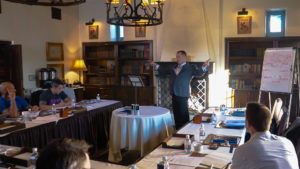Seek to understand before seeking to be understood.
We have all heard the trope that if we want to be heard, we must first listen. Or in Covey’s Seven Habits, he tells us to seek to understand before seeking to be understood. Without question, the ability to listen deeply, with your full attention, and seek to understand will set you apart from many leaders.
It has always been a challenge for people to let go of the notion that they need to anticipate, predict, and prepare a response to what is being discussed. You will be amazed at how much more enjoyable your conversations become, how much more you retain, and how much more trust is built when tuned into a discussion with well-honed listening skills.

Tip #1: Prepare, but don’t write a script.
One misstep I’ve observed is in preparation for client meetings; however, the habit may seep into your listening habits with others.
In our effort to prepare for a client meeting, what often occurs is that we are researching to anticipate any possible question so that we have an answer. We make this same error with other relationships, listening for a problem to provide a solution.
However, that is not the only point of a conversation; therefore, this tip will remove a lot of “anticipatory stress” from your shoulders.
When necessary, prepare for a meeting by reading, reviewing, and considering background information.
After that, simply listen to the message without allowing your mind to solve what you perceive as the problem.
By not writing a script for how this conversation may unfold, you will keep yourself from being distracted when it invariably goes off that script.

Tip #2: Listen with focus.
It’s not that you lack time; you lack focus.
We all have the exact 168 hours per work without exception; therefore, the only thing that separates you from someone else is your ability to be efficient and effective with your time.
How do you do this?
First, give each task and conversation your undivided attention.
Most issues have simple solutions–and please note that I said simple, not easy. You know precisely what I’m going to say. Shut off the notifications, look the person in the eye, and take written notes. Even in our modern era, we can accomplish this in video meetings. Block time to open your email client, keeping it closed at other times. During a video meeting, ensure that Zoom (or your preferred tech) window is below your camera to allow natural eye contact.
Finally, take notes to ask questions without interrupting the flow. When on video, I type letters, always telling my clients I’m doing so. My written notes are captured and converted when meeting in person using my reMarkable Tablet.

Tip #3: Confirm by paraphrasing.
If you have applied the first two tips, you are well-prepared and focused on the speaker. Because you are focused, you know what the natural pause sounds like.
Then, using your notes, ask a clarifying question to validate your understanding or ask for more information to broaden a point.
Finally, paraphrase the speaker’s words to get to the heart of the message and anchor what you’ve heard. You will see that your understanding, retention, and connection are strengthened with these three tips.
In addition, trust will grow when others experience your listening skills through your attention and recall. With your listening skills, you can build mastery in the four F’s: follow-up, follow-through, focus, and flexibility.
The six simple keys to building independent, accountable teams are being capable of communicating, delegating, motivating, recruiting, collaborating, and developing.
Your personal and professional relationships benefit from strong communication skills, a key component of which is listening. We can all name a person with horrible listening skills. What do they do? They interrupt, overtalk, look at screens, seem lost, and later, don’t recall any part of the discussion.

As a strong leader, you want to role model good listening skills at every opportunity. If unsure where to begin, schedule a Meet & Greet, and talk with Ken Kilday.
When working with an individual leader, or their entire leadership team, Ken uses tools like Talent Dynamics to begin the journey of self-awareness necessary to be a great communicator that listens well.
A team that listens to one another has focus and intention, is efficient in the process, moves more quickly to solve problems, builds relationships, and enjoys improved profitability. Call us today to build a plan for better listening skills on your team.




